Blackboard’s AI design assistant, launched last December, has quickly proven to be a helpful tool for developing content within NILE courses. Our early data shows that while most users create tests independently, the AI design assistant is especially popular for test and quiz creation. Senior Lecturer in Nursing, Julie Holloway, shares her positive experience using AI to support her pharmacology students in a prescribing program.
“We are using AI to help generate new exam questions, particularly in relation to pharmacology content,” Julie explains. Due to the parameters of professional regulation within independent prescribing, she’s unable to provide students with past exam papers for their revision. Instead, AI has allowed her to create supplemental revision questions directly linked to each pharmacology lecture, providing students with valuable practice material aligned with their coursework.
One notable feature in the AI design assistant enables users to select existing course materials for the AI to draw from when generating content. Julie has leveraged this by selecting specific pharmacology materials, allowing her to create questions that closely reflect the lectures and give students an efficient tool for self-assessment. “The process was easier than I originally thought,” she adds.
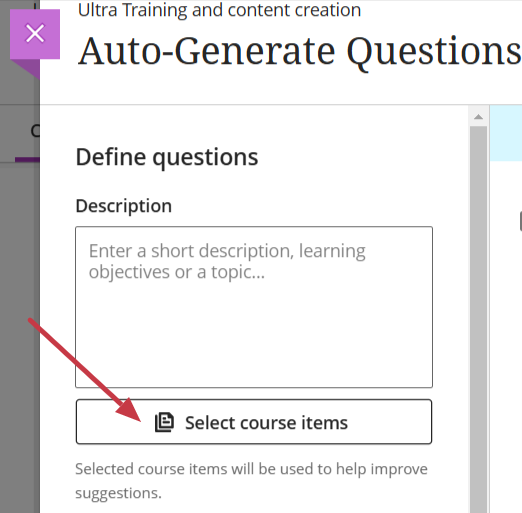
As well as helping with efficiency, Julie also noted the AI’s capacity to inspire new ways of phrasing questions. “Exam questions can become repetitive,” she says, and the AI’s suggestions help with this and enhance the student experience by supplementing their revision.
In thinking about the limitations of using AI to create test questions, Julie points out that the AI occasionally generates questions that aren’t entirely relevant. However, she highlights, “I think this will improve as we get more experienced with working with AI and search terms, etc.”
Would she recommend this approach to other educators? “Absolutely,” she says, encouraging colleagues to explore the tool themselves. “Just give it a try—it’s not as scary as you think!”
If you would like any support using any of the AI Design Assistant tools in NILE, then please contact your Learning Technologist. If you are unsure who this is, then please select this link: https://libguides.northampton.ac.uk/learntech/staff/nile-help/who-is-my-learning-technologist
For more information on the AI Design Assistant, then please select this link: https://libguides.northampton.ac.uk/learntech/staff/nile-guides/ai-design-assistant
As part of a longitudinal study into student perspectives of Generative Artificial Intelligence (GenAI), Learning Technologists Richard Byles and Kelly Lea, along with Head of Learning Technology Rob Howe, have published the results of their second student survey, launched in February 2024.
This 2024 report reveals a significant shift in the role of GenAI in students’ academic lives and their changing motivations to engage with these technologies. Notably, the survey highlights a marked increase in student use of GenAI since the 2023 survey with distinct differences in usage and views between UK and international students.
Key findings indicate a growing awareness among students about both the benefits and limitations of GenAI. Many students appreciate its ability to assist with summarising content, generating ideas, and editing text. However, they are increasingly questioning where data is gathered from and its reliability. Students remain ethically aware and want to ensure academic integrity when using these tools.
The full report can be viewed below.

Report Link (PDF): Exploring Student Perspectives of Generative Artificial Intelligence Tools at the university of Northampton: A survey-Based Study
R Byles, K Lea, R Howe
With an overload of information and such dichotomous opinions about Artificial Intelligence (AI), it is difficult to know where to begin; especially if you are yet to experience using AI at all. One starting point is to find out where you are with your own knowledge and the Jisc discovery tool can assist with this.
The discovery tool, which was introduced to UON in 2020, is a developmental tool that students and staff can use to self-assess their digital capabilities, identify their strengths, and highlight opportunities to develop skills. The tool has been recently updated to include a question set for both staff and students on their capability and proficiency with AI and generative AI tools.
The question sets for students and staff have been developed with assistance from Jisc and aligns with the latest AI advice and AI guiding principles developed by Jisc and the Russell Group on the responsible and equitable use of AI to enhance learning and teaching.
How the discovery tool helps students and teachers
The new question sets provide users with a basis to self-assess their skills and knowledge of what AI is and how it could, or should, be used in the context of their studies or role.
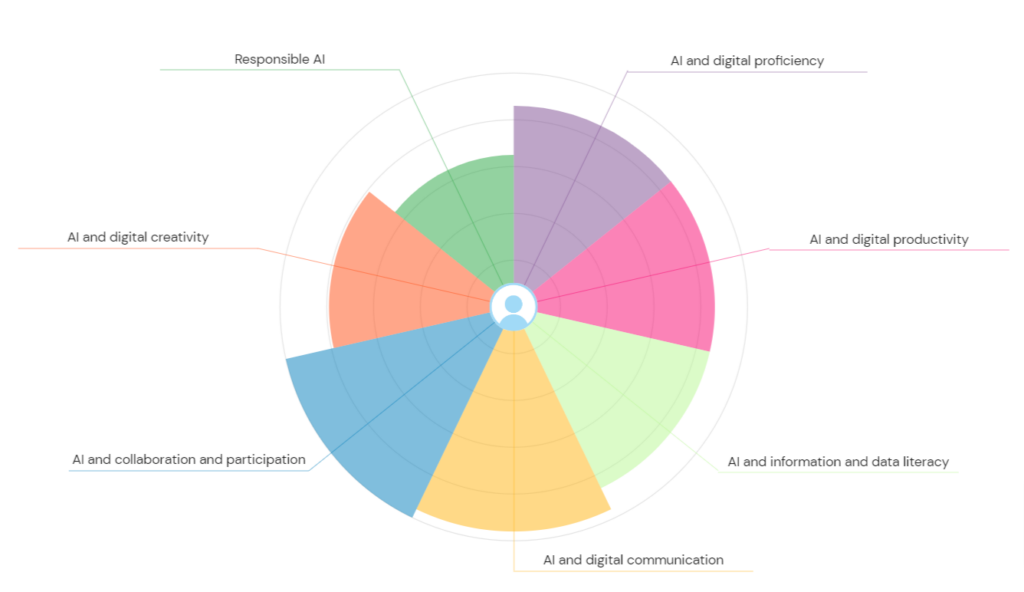
Once users complete the question set, they can then access a personalised report with a confidence rating which will vary from ‘developing’ through ‘capable’ to ‘proficient’ depending on their experience. The report also provides recommendations and courses on how to advance knowledge around AI.

Users can repeat any of the discovery tool’s question sets at any point and therefore keep a dynamic view of their confidence levels.
Where can I access the tool?
Click here to log straight into the discovery tool and the AI question set, or copy and paste the link below into your address bar.
How can I Support Students?
To assist students in enhancing their digital skills and their knowledge and understanding of AI, we have put together a student guide which can be found here. It may also be helpful to add a link to this guide, or to the discovery tool itself, within NILE courses.
What if I would like to know more?
For more information about how to use the discovery tool, see: https://digitalcapability.jisc.ac.uk/resources-and-community/discovery-tool-guidance/staff/
For further information about the AI design assistant in NILE or Padlet’s new AI features, please get in touch with your Learning Technologist.
Helpful links
The year 2023 is proving to be a fascinating one for generative AI tools, with ChatGPT, the latest chatbot from OpenAI, crossing the 100 million user line in January 2023, making it the fastest-growing consumer application in a short period of time (source: DemandSage). ChatGPT is a large language model that provides detailed answers to a wide range of questions. Ask it to summarise a report, structure a presentation or activities for your session and you may well be pleased with the results. ChatGPT’s ease of use, speed of response, and detailed answers have seen it quickly dominate the AI generator market and gain both widespread acclaim and criticism.
While early media attention focused on the negative, playing on sci-fi tropes and the out-of-control desires of AI tools, scientists such as Stephen Wolfram have been exploring and explaining the capabilities and intricacies of ChatGPT, expertly raising awareness of its underlying Large Language Model architecture and its limitations as a tool.
In his recent talk on the Turnitin Webinar ‘AI: friend or foe?’, Robin Crockett – Academic Integrity Lead here at UON, discussed how a better understanding of the ability of ChatGPT to create content can be used to deter cheating with AI tools. However, concerns have also been raised about students using the tool to cheat, claiming that minimal effort required to enter an essay question in ChatGPT may produce an essay that may be of an adequate standard to, at least, pass an assessment (source: The Guardian).
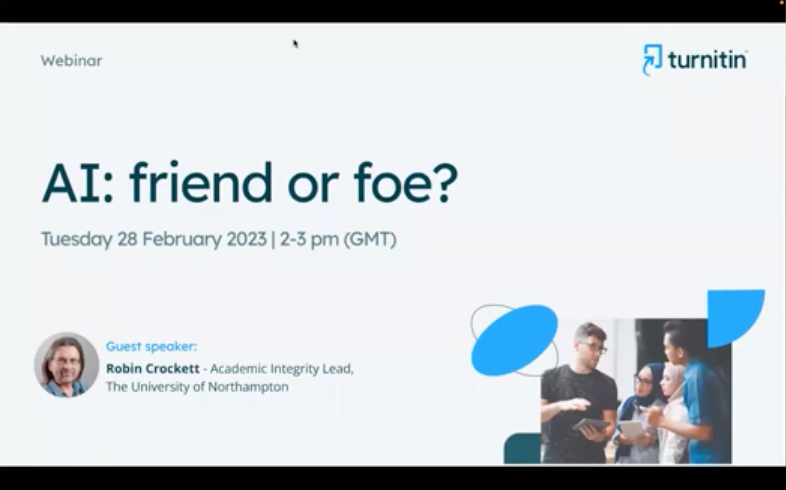
Link to YouTube, Turnitin Session: AI friend or foe? 28/02/23 (CC Turnitin)
The next webinar in the Turnitin series entitled ‘Combating Contract Cheating on Campus’ with expert speakers Robin Crockett, Irene Glendinning and Sandie Dann, can be found here.
One thing the media stories seem to agree upon is that generative AI tools have the potential to change the way we do things and challenge the status quo, with some traditional skill sets at risk of becoming replaced by AI, and new opportunities for those who embrace these technologies.
In terms of how AI might be utilised by academic staff, Lee Machado, Professor of Molecular Medicine, describes his use of AI tools in cancer classification and how AI tools might be used to help answer questions in his field. Lee also discusses how he feels AI tools such as ChatGPT could improve student experiences by providing personalised feedback on essays and by simplifying complex information.
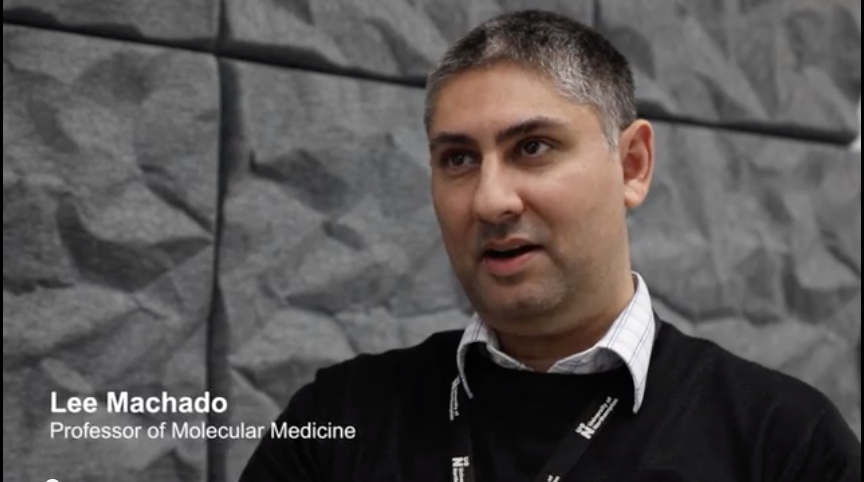
In the following interview, Jane Mills, Senior Lecturer in Fashion and Textiles, discusses how the fashion industry is embracing AI, emphasising that rather than AI replacing creativity, it can be used to enhance creative work. Students Amalia Samoila and Donald Mubangizi reflect on the collaborative nature of working with AI, using examples of their current work.

In his interview, Rob Howe, Head of Learning Technology, discusses the evolution of AI technology and its impact on the academic world. He explains that AI has come a long way since the original definitions by Minsky and Turing in the 1950s and that improvements in processing speed and access to data have made it a revolution in technology. Rob describes how AI technology has already been integrated into tools and academic systems in universities and how the rise of AI technology has led to a change in the way assignments are being considered, as students may now be using AI systems to assist in their studies. Although there is discussion around institutions wishing to ban the use of AI in academic work, Rob emphasizes the importance of learning to live with such tools and using them in a way that supports educators and students. AI systems have the potential to be a valuable resource for tutors to generate learning outcomes and offer new ideas which can then be critically evaluated and modified.
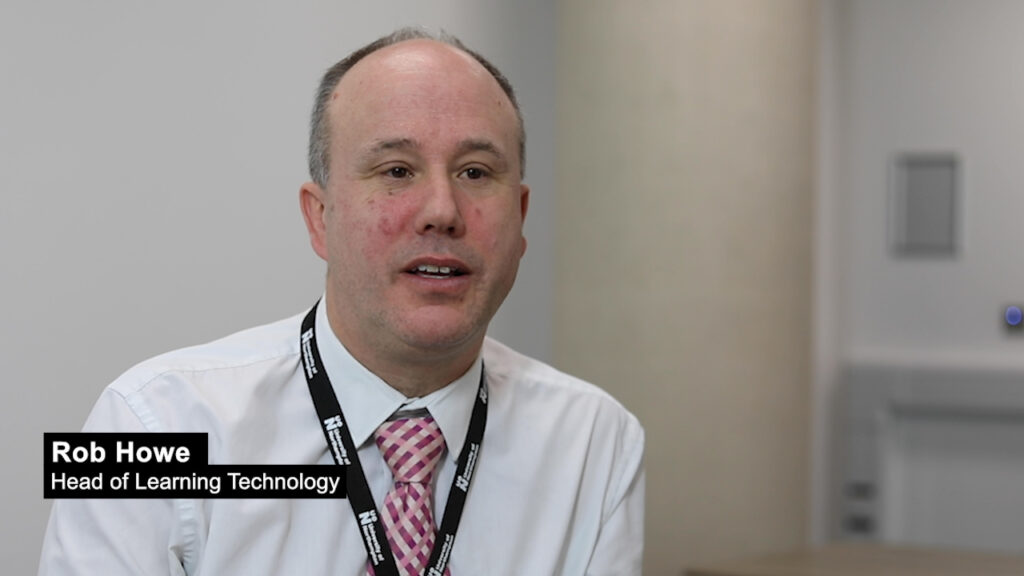
Exploring AI through multiple platforms and apps is a great way for users to get started. However, it’s important to note that not all AI tools are free. While many offer free tokens or limited availability for new users, some require payment. Our team member, inspired by the use of AI-generated images by an art student at UON, tried the IOS app, Dawn AI, which offered a 3-day trial. They enjoyed generating 48 new versions of themselves and even created versions of themselves as a warrior and video game character.
However, it’s important to consider whether using AI in this way is simply a gimmick or if it has a more purposeful use. It’s easy to dismiss AI-generated images as mere novelties, but the potential applications of this technology are vast and varied. AI-generated images can be used in advertising, social media marketing, and even in the film industry. As AI continues to develop and evolve, we’re likely to see even more innovative and exciting uses for this technology. The possibilities are endless.
The full extent of how AI tools will fit into daily academic life is yet to be determined. While some believe that AI has the potential to revolutionize the way in which we teach and learn, others remain skeptical about its ethical implications and its potential to negatively impact student engagement.
One of the main concerns is whether AI tools will prove to be a positive tool to enhance creativity and support students or whether they will provide a shortcut to assessments that undermine the learning process. It is clear that there are significant implications for how educators use AI tools in the classroom.
To explore these issues and more, Rob Howe, Head of Learning Technology at the University of Northampton (supported by University staff, external colleagues and the National Centre for A.I.), will be running a series of debates and talks on campus and online. These discussions will aim to assess the potential of AI tools and examine their ethical implications. Participants will discuss the challenges and opportunities presented by AI, and debate the best ways to incorporate these tools into the classroom.
The first of these debates, titled, ‘The computers are taking over…?’, is on March 15th. The full details can be found here; https://blogs.northampton.ac.uk/learntech/2023/01/30/the-computers-are-taking-over-debate/
Link to future Webinar from the series: https://www.turnitin.com/resources/webinars/turnitin-session-series-contract-cheating-2023
Authors: Richard Byles and Kelly Lea.
Simulation has become an integral part of teaching and learning pedagogy within the Health Faculty at UON. In order to operationalise the faculty’s simulation strategy, a lead for simulation was recruited in September 2022. Roshini Khatri, Head of Health Professions, explains why:
“Simulation is used regularly in Healthcare as a learning and teaching technique to create situations or environments to allow persons/students to experience a demonstration of real-life scenarios for the purpose of practice and learning in a safe and nurturing environment. We have chosen to embed simulation as part of our curriculum to ensure that we are using contemporary and innovative activities to support the healthcare professionals of the future.”
The new Academic Lead for Simulation, Kate Ewing, is passionate about how the use of simulation and virtual reality scenarios can create more immersive, engaging, and more productive learning outcomes. Kate explains that simulation ranges from a technical skill, for example, where students might be learning to catheterise, to a more immersive scenario which is designed to give students the opportunity, in a safe and controlled environment, to experience a clinical situation.
(Click the image or text link below to launch the video in a new tab)
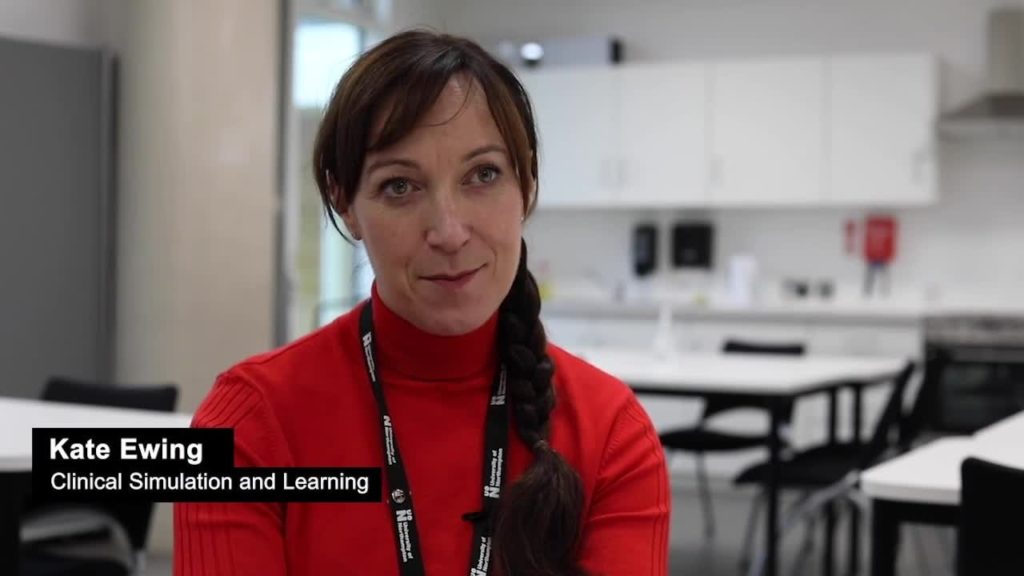
Video: Interview with Kate Ewing and Hannah Cannon
The challenge Kate has, is scenarios need to be written and carefully constructed with learning outcomes at the forefront. Kate admits this can create a ‘heavy workload’ for academic staff, so her aim is to see how these scenarios can be utilised across programmes so they fulfil a range of learning outcomes; allowing students to work inter-professionally with each other, rather than having a single use.
Kate is aware of the limitations of this technology when utilised by small groups or individuals at a time. However, Kate’s strategy provides a “shift in thinking” which encompasses all of the students in the learning process. In her learning situations, the students become observers of the process taking place. Kate comments: “Evidence says, if you debrief the situation and the learning in the right way, observers gain as much as the participants. The simulation is seen as an excuse for a debrief – the debrief is where the rich learning takes place”.
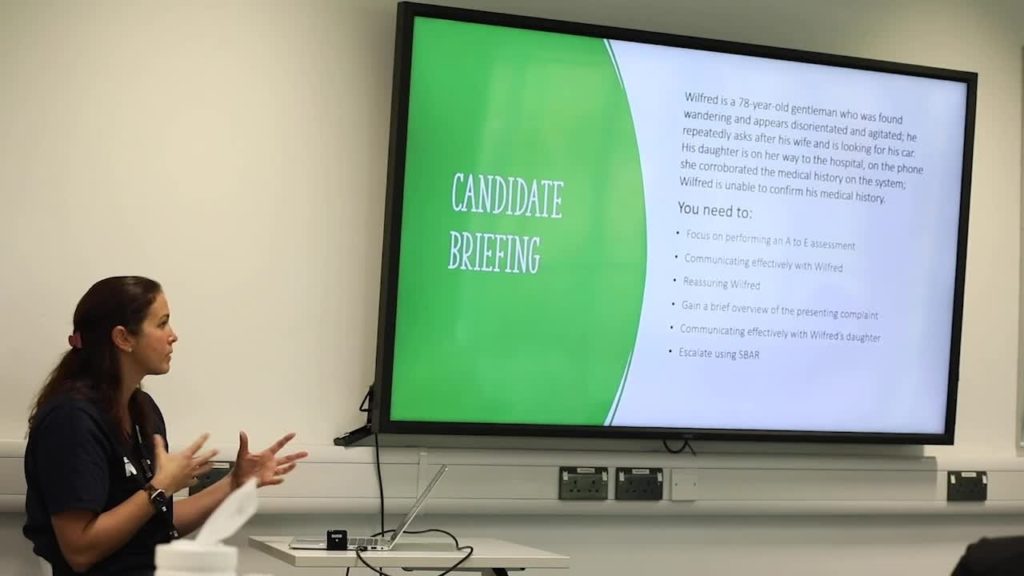
Kate highlights how simulations in a learning environment are very different to clinical settings. “Students aren’t just testing out their skills, as they might do in a clinical environment, rather, they are developing skills of communication and those human factors which require a more intricate debrief strategy”. Although Virtual Reality (VR) scenarios contain published debriefs, Kate feels strongly these need customising so they can be mapped closely to the learning outcomes of individual programmes at UON.
Hannah Cannon, Practice Lead for Nursing Associates, has been working with students on their clinical skills using a VR platform in a whole class situation. Hannah said that in her experience, students seem to feel “really safe” when engaging with scenarios in this way. Her students can play through a scenario safely without the need to worry about the consequences of their decision–making. Hannah believes by having a group of students present, it allows for a more productive and wider discussion about patient care. As a team, the students can work together to make decisions about the patient’s treatment.
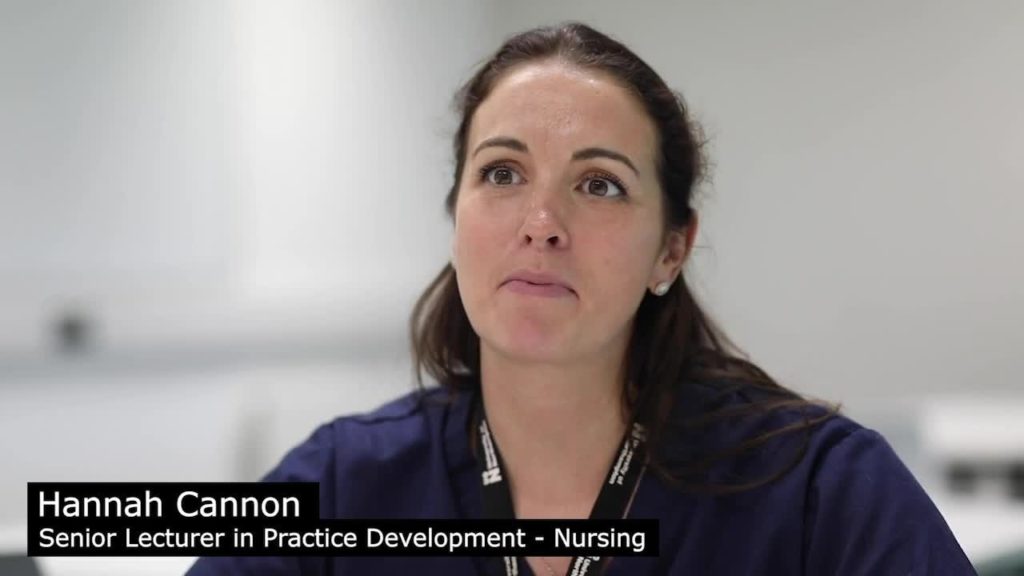
Hannah emphasises how the use of a debrief, which is usually twice as long as the scenario, permits her students to have more effective discussions about the scenario and to reflect on their decision-making. Hannah feels this style of immersive learning allows her students to better grasp their learning outcomes by having the opportunities to see their decision-making play out and then by reflecting on the end result. She goes on to say that it, “heightens student’s self-awareness both professionally and personally,” which she feels is fundamental in nursing care.
Although immersive and engaging, Kate understands simulations are not an “easy answer” to fulfilling learning outcomes at UON, due to their time-consuming nature. But Kate is passionate that, through her role, she will be able to help create a strategy that supports staff to not only fulfill learning outcomes in a more productive way within their own programme, but to enable collaborative scenario-based learning to be adopted across programmes in a more cohesive and versatile way.
Recent Posts
- H5P (HTML5 package) content types meets the needs of Jim Atkinson, Staff Development Trainer
- Blackboard Upgrade – July 2025
- StudySmart 2 – Student Posters
- NILE Ultra Course Award Winners 2025
- Blackboard Upgrade – June 2025
- Learning Technology / NILE Community Group
- Blackboard Upgrade – May 2025
- Blackboard Upgrade – April 2025
- NILE Ultra Course Awards 2025 – Nominations are open!
- Blackboard Upgrade – March 2025
Tags
ABL Practitioner Stories Academic Skills Accessibility Active Blended Learning (ABL) ADE AI Artificial Intelligence Assessment Design Assessment Tools Blackboard Blackboard Learn Blackboard Upgrade Blended Learning Blogs CAIeRO Collaborate Collaboration Distance Learning Feedback FHES Flipped Learning iNorthampton iPad Kaltura Learner Experience MALT Mobile Newsletter NILE NILE Ultra Outside the box Panopto Presentations Quality Reflection SHED Submitting and Grading Electronically (SaGE) Turnitin Ultra Ultra Upgrade Update Updates Video Waterside XerteArchives
Site Admin

